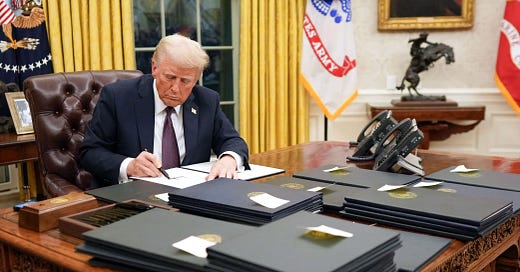Trump’s economic plan for America
A non-imperialist proposal for strengthening the national economy
Among the numerous executive orders and memoranda signed by Donald Trump on January 20-21, some amounted to the formulation of a non-imperialist proposal for strengthening the American economy. These include “Delivering Emergency Price Relief for American Families and Defeating the Cost-of-Living,” “America First Trade Policy,” and “Unleashing American Energy.”
The Trump administration maintains that families are overwhelmed by the cost of fuel, food, housing, automobiles, medical care, utilities, and insurance as a result of excessive government deficit spending, which artificially increases demand, combined with government regulations that constrain American production. There are, for example, regulations based on politically and ideologically driven interpretations of the impact of various forms of energy production on the environment, when actual impact on the environment is negligible. In addition, government mandates have resulted in higher pri…



